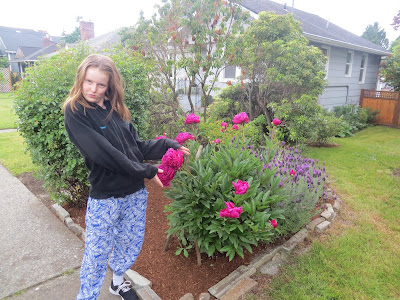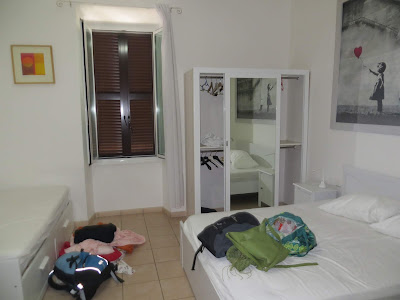Wanting what you haven't got is a sure-fire way to unhappiness. It's bad for personal finances, too. It's good for businesses who peddle homeware and renovation supplies, though.
But we all have to live somewhere, and many of us innately want to have attractive surroundings. On our recent overseas trip, I took the opportunity to indulge in these. Prepare also for more than a spattering of gardens.
Seattle
In Seattle, I stepped inside my dream home magazine. At least in the suburbs I wandered with my children, nobody had torn down their craftsman home to put up an eaveless box with vast quantities of double-glazed windows. Instead we saw sweet wooden house after wooden house, each a bit different and colourfully painted.There was a bit of the kiwi about them, except it was the type that shows up more in vivid stylized paintings of wooden New Zealand houses than in reality. It was a supercharged scene of colourful historic houses, and gardens that struck an unusual balance between style and wilderness.
The people who built these houses cared for their curvaceous details, and so do today's owners. These are loved houses. They are also extremely expensive - Seattle has hugely pricey real estate.
The gardens boasted flowers, texture, colour and a bit of wildness. The sections were small, the lawns were tidy and the plantings were generous. They looked so unlike New Zealand gardens! This might be because the winters are much colder there, and they have access to plants that we don't (and vice versa, of course).
 |
| Why restrict your garden to your own property when the berm is available? |
 |
| Me pretending I live here. |
But many of the plants were familiar, and the differences were less about content and more about style. It made me realise that as with clothes, we obviously follow the crowds with gardening and do what others are doing, without being remotely aware that we are being sheep.
The bees were loving it.
Chamonix
I can't even remember what made me aware of this darling little French alpine town, or that I wanted to go there. Something I read years ago, I suspect. When I saw the hassles we'd have to go to get there by train from Vienna, our previous planned stop, I wondered if I was mad and my children would be undone by the hours we had to spend on the train and the changes we had to make. |
| Mont Blanc towers behind Chamonix |
But by the time we got on the last train, the "Chamonix Express", we were utterly sold. This was a slow (non-express) narrow gauge railway that climbed and twisted through enormously high snowy mountains. I could not believe the scale and beauty of them, the altitude of the little villages - most of which we stopped at - nor the sweetness of the wooden Swiss chalets. Even the newly-built ones looked like something from the "Heidi" television series I used to watch.
Our clean little train had enormous windows, and if we could have reached out of them we would almost have been able to stroke the conifers and ferns and cool our hands under the small waterfalls. This was a land of dense forest, some green pasture, towering snowy peaks and well-worn rock. And very large stacks of firewood.
I will never go on a lovelier train ride. I doubt there is one. It was very cheap, too.
But to the houses and gardens of Chamonix. This is another planet of housing, as pretty as it gets and built to keep people warm and uninundated by the undoubtedly copious winter snow. The houses crawled with roses and clusters of bright flowers.
 |
| The house we stayed in - a former sheepfold, which was (and is) no doubt much needed in this place in winter. if you are a sheep. The stone walls were about half a metre thick! |
 |
| The mountains hang decoratively in the background. |
 |
| The view from our flat. |
As I wandered the narrow lanes between the houses - and nowhere seems to be more than 15 minutes or so from the town centre - my eyes gobbled up the vegetable gardens. I love to see others' vege gardens, especially lavish foreign ones! We are all united by our bellies, and I saw that people everywhere love to grow things and create beauty.
Here we were 1000 metres closer to the sun, with the 4,810 metre-high permanently snowy Mont Blanc decorating the sky nearby. All around were snowy ranges, and often the colourful sails of paragliders flying off the mountains (there are gondolas ascending them).
The air was clear and bright, and cleaner than clean. Next to Mont Blanc, an enormous blue-grey glacier rolled down towards us. And the humans clipped their roses, watered their flower pots, plucked their strawberries and considered what to serve with the salad greens that emerged from the soil they tended. Perhaps one of the 50 or so cheeses in their small local supermarket?
Food, flowers and great beauty - I was very happy.
Parisian gardens
It was not the gardens themselves that grabbed me in Paris. We are spoiled in Hamilton when it comes to impressive gardens, and in Europe I repeatedly thought that public gardens and palaces needed a team from Hamilton Gardens to come and advise them on style and maintenance. But I there were a couple of quirky things that caught my eye: |
| A scraggy vegetable in the shadow of the Notre Dame. |
 |
| A goat in the Tuileries garden, central Paris. There was a slight bank and the grass needed to be kept down. Why are you laughing? What's wrong with a goat in one of the world's most famous gardens? |
England
Oh, the Oxford and the Cotswolds - is there anywhere in the world that does gardens better? |
| Magdalen College, Oxford. |
 |
| Oxford Botanic Gardens |
 |
| Christchurch College |
 |
| Ebrington village, Cotswolds. |
 |
| A vegetable garden in St James' Park, London. Buckingham Palace is at the opposite end of the park. |
Once my young nephew said "We speak different languages, but we all smile the same". Wise words from a little boy. As I travelled, I noticed that we definitely speak different languages, but we all like to grow things.

























